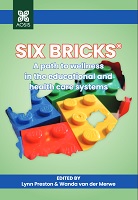Six Bricks®
A path to wellness in the educational and health systems
| dc.contributor.author | Preston, Lynn | |
| dc.contributor.author | van der Merwe, Jaco | |
| dc.contributor.author | van der Merwe, Wanda | |
| dc.contributor.author | le Roux, Villera | |
| dc.contributor.author | Breytenbach, Tarien | |
| dc.contributor.author | Mong, Elmaré | |
| dc.contributor.author | Bester, Petra | |
| dc.contributor.author | Liversage, Christelle | |
| dc.contributor.author | Niesing, Christi | |
| dc.contributor.author | Fouche, Elmari | |
| dc.contributor.author | Ramadie, Kedibone J. | |
| dc.contributor.editor | Preston, Lynn | |
| dc.contributor.editor | van der Merwe, Wanda | |
| dc.date.accessioned | 2024-02-28T11:00:04Z | |
| dc.date.available | 2024-02-28T11:00:04Z | |
| dc.date.issued | 2023 | |
| dc.identifier | OCN: 1424916997 | |
| dc.identifier.uri | https://library.oapen.org/handle/20.500.12657/88047 | |
| dc.description.abstract | The Six Bricks® initiative is a teaching and learning method that encourages focused engagement in the classroom by all learners, from the foundation phase to adulthood. By using six simple, colourful DUPLO® bricks, an element of play is introduced into a situation that inevitably leads to all individuals focusing and interacting. This is one of the major contributions to all teaching and learning disciplines and promotes the audience to learn with enjoyment, enthusiasm and concentration. Along with this, communication is promoted, sparking unimaginable creativity and creation. This book provides the reader with an alternative focus to the original educational application of the Six Bricks® activities. This Six Bricks® initiative focuses on the therapeutic application and processes in communities, schools and within individuals themselves. As each author has had an intimate connection with Six Bricks® initiative, they are all more than qualified to provide their autoethnographic reflections on this initiative, which holds so much promise and excitement for learning and teaching. Therefore, each author’s contributions were original and personalised, providing a new field in the avenues of research in the South African context, as South Africa does not have – as yet – much research on this topic. The methodology used in this qualitative research study was primarily from each author’s perspective; thus, their self-reflection and anecdotal personal experiences form the core of these chapters. Therefore, this autoethnographic is a self-reflective form of writing which involves self-observation and reflective investigation in the context of ethnographic fieldwork and writing. | en_US |
| dc.language | English | en_US |
| dc.subject.classification | thema EDItEUR::J Society and Social Sciences::JN Education::JNC Educational psychology | en_US |
| dc.subject.other | South Africa;LEGO;6Bricks;Sustainable Educational Development;Educational system;Positive psychology;wellness;Sustainable Development, health system | en_US |
| dc.title | Six Bricks® | en_US |
| dc.title.alternative | A path to wellness in the educational and health systems | en_US |
| dc.type | book | |
| oapen.identifier.doi | 10.4102/aosis.2023.BK427 | en_US |
| oapen.relation.isPublishedBy | d7387d49-5f5c-4cd8-8640-ed0a752627b7 | en_US |
| oapen.relation.isbn | 9781779952936 | en_US |
| oapen.relation.isbn | 9781779952943 | en_US |
| oapen.imprint | AOSIS Books | en_US |
| oapen.pages | 262 | en_US |
| oapen.place.publication | Capetown | en_US |

